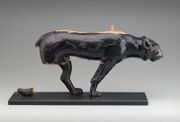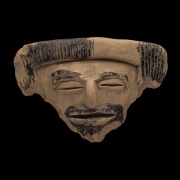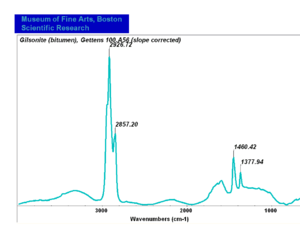Difference between revisions of "Bitumen"
m (Text replace - "== Authority ==" to "== Sources Checked for Data in Record ==") |
|||
| (5 intermediate revisions by 2 users not shown) | |||
| Line 1: | Line 1: | ||
| − | [[File:1993.775-SC31053.jpg|thumb| | + | [[File:SC28609.jpg|thumb|Egyptian leopard in bitumen covered wood<br>MFA# 03.1137]] |
| + | [[File:1993.775-SC31053.jpg|thumb|Human effigy<br>MFA# 1993.775]] | ||
== Description == | == Description == | ||
| − | + | The natural, non-solid material in petroleum deposits. Bitumen or crude oil, is composed of the organic, or hydrocarbon, portion of [[asphalt]]. It is a viscous, dark brown or black semisolid material that was used by ancient Egyptians as an adhesive. Bitumen is still used in hot-melt adhesives, coating, paints, sealants, roofing and road coating. Chemically, bitumen contains: naphthenic aromatic compounds along with saturated hydrocarbons, and high molecular weight phenols. although there is not evidence of health effects from its use, all petroleum product are a source of air pollution. | |
| + | |||
| + | The name bitumen has been used as a synonym for [[asphaltum]], [[tar]], and [[pitch]] and was also used as a commercial product name for a transparent, brown artists pigment made from asphaltum. | ||
== Synonyms and Related Terms == | == Synonyms and Related Terms == | ||
Bitumen (Deut.); bitume (Fr.); bitumen (Esp.); bitume (It.); betume (Port.); asphaltum; tar; pitch; asphaltum; tar; pitch; | Bitumen (Deut.); bitume (Fr.); bitumen (Esp.); bitume (It.); betume (Port.); asphaltum; tar; pitch; asphaltum; tar; pitch; | ||
| + | [[[SliderGallery rightalign|Gilsonite (bitumen) Gettens.PNG~FTIR (MFA)]]] | ||
| − | == | + | == Risks == |
| − | + | * Combustible. | |
| − | + | * Softens at slightly elevated temperatures. | |
| − | + | * Ages poorly in dried oil films resulting in movement, disfigurement and/or cracks. | |
| − | |||
| − | |||
| − | |||
| − | |||
| − | |||
| − | |||
| − | |||
| − | + | ==Physical and Chemical Properties== | |
| − | + | * Soluble in carbon disulfide. | |
| − | + | * Refractive Index = 1.64 - 1.66 | |
| − | |||
| − | == | ||
| − | |||
| − | |||
| − | |||
| − | |||
| − | |||
| − | |||
| + | ==Resources and Citations== | ||
| + | * Wikipedia: [https://en.wikipedia.org/wiki/Bitumen Bitumen] Accessed March 2025 | ||
| + | * R.White "Brown and Black Organic Glazes, Pigments and Paints" ''National Gallery Technical Bulletin'', 10:58-71, 1986. | ||
| + | * Georgiana Languri, Molecular studies of Asphalt, Mummy and Kassel earth pigments, MOLART report 2004, available through Archetype Publications, London. | ||
* John S. Mills, Raymond White, ''The Organic Chemistry of Museum Objects'', Butterworth Heineman, London, 2nd ed., 1994 | * John S. Mills, Raymond White, ''The Organic Chemistry of Museum Objects'', Butterworth Heineman, London, 2nd ed., 1994 | ||
| − | |||
* R. J. Gettens, G.L. Stout, ''Painting Materials, A Short Encyclopaedia'', Dover Publications, New York, 1966 | * R. J. Gettens, G.L. Stout, ''Painting Materials, A Short Encyclopaedia'', Dover Publications, New York, 1966 | ||
| − | |||
* G.S.Brady, ''Materials Handbook'', McGraw-Hill Book Co., New York, 1971 Comment: p. 76 | * G.S.Brady, ''Materials Handbook'', McGraw-Hill Book Co., New York, 1971 Comment: p. 76 | ||
| − | |||
* Ralph Mayer, ''A Dictionary of Art Terms and Techniques'', Harper and Row Publishers, New York, 1969 (also 1945 printing) | * Ralph Mayer, ''A Dictionary of Art Terms and Techniques'', Harper and Row Publishers, New York, 1969 (also 1945 printing) | ||
| − | |||
* ''Dictionary of Building Preservation'', Ward Bucher, ed., John Wiley & Sons, Inc., New York City, 1996 | * ''Dictionary of Building Preservation'', Ward Bucher, ed., John Wiley & Sons, Inc., New York City, 1996 | ||
| − | |||
* ''The Dictionary of Art'', Grove's Dictionaries Inc., New York, 1996 | * ''The Dictionary of Art'', Grove's Dictionaries Inc., New York, 1996 | ||
| − | |||
* Richard S. Lewis, ''Hawley's Condensed Chemical Dictionary'', Van Nostrand Reinhold, New York, 10th ed., 1993 | * Richard S. Lewis, ''Hawley's Condensed Chemical Dictionary'', Van Nostrand Reinhold, New York, 10th ed., 1993 | ||
| − | |||
* Henry Hodges, ''Artifacts: An Introduction to Early Materials and Technology'', Ronald P. Frye, Kingston, Canada, 1988 | * Henry Hodges, ''Artifacts: An Introduction to Early Materials and Technology'', Ronald P. Frye, Kingston, Canada, 1988 | ||
| − | |||
* Thomas C. Jester (ed.), ''Twentieth-Century Building Materials'', McGraw-Hill Companies, Washington DC, 1995 | * Thomas C. Jester (ed.), ''Twentieth-Century Building Materials'', McGraw-Hill Companies, Washington DC, 1995 | ||
| − | |||
* ''Van Nostrand's Scientific Encyclopedia'', Douglas M. Considine (ed.), Van Nostrand Reinhold, New York, 1976 | * ''Van Nostrand's Scientific Encyclopedia'', Douglas M. Considine (ed.), Van Nostrand Reinhold, New York, 1976 | ||
| − | |||
* Random House, ''Webster's Encyclopedic Unabridged Dictionary of the English Language'', Grammercy Book, New York, 1997 | * Random House, ''Webster's Encyclopedic Unabridged Dictionary of the English Language'', Grammercy Book, New York, 1997 | ||
| − | |||
* ''The American Heritage Dictionary'' or ''Encarta'', via Microsoft Bookshelf 98, Microsoft Corp., 1998 | * ''The American Heritage Dictionary'' or ''Encarta'', via Microsoft Bookshelf 98, Microsoft Corp., 1998 | ||
| − | + | * Art and Architecture Thesaurus Online, https://www.getty.edu/research/tools/vocabulary/aat/, J. Paul Getty Trust, Los Angeles, 2000 | |
| − | * Art and Architecture Thesaurus Online, | ||
[[Category:Materials database]] | [[Category:Materials database]] | ||
Latest revision as of 11:56, 13 March 2025
Description
The natural, non-solid material in petroleum deposits. Bitumen or crude oil, is composed of the organic, or hydrocarbon, portion of Asphalt. It is a viscous, dark brown or black semisolid material that was used by ancient Egyptians as an adhesive. Bitumen is still used in hot-melt adhesives, coating, paints, sealants, roofing and road coating. Chemically, bitumen contains: naphthenic aromatic compounds along with saturated hydrocarbons, and high molecular weight phenols. although there is not evidence of health effects from its use, all petroleum product are a source of air pollution.
The name bitumen has been used as a synonym for Asphaltum, Tar, and Pitch and was also used as a commercial product name for a transparent, brown artists pigment made from asphaltum.
Synonyms and Related Terms
Bitumen (Deut.); bitume (Fr.); bitumen (Esp.); bitume (It.); betume (Port.); asphaltum; tar; pitch; asphaltum; tar; pitch;
Risks
- Combustible.
- Softens at slightly elevated temperatures.
- Ages poorly in dried oil films resulting in movement, disfigurement and/or cracks.
Physical and Chemical Properties
- Soluble in carbon disulfide.
- Refractive Index = 1.64 - 1.66
Resources and Citations
- Wikipedia: Bitumen Accessed March 2025
- R.White "Brown and Black Organic Glazes, Pigments and Paints" National Gallery Technical Bulletin, 10:58-71, 1986.
- Georgiana Languri, Molecular studies of Asphalt, Mummy and Kassel earth pigments, MOLART report 2004, available through Archetype Publications, London.
- John S. Mills, Raymond White, The Organic Chemistry of Museum Objects, Butterworth Heineman, London, 2nd ed., 1994
- R. J. Gettens, G.L. Stout, Painting Materials, A Short Encyclopaedia, Dover Publications, New York, 1966
- G.S.Brady, Materials Handbook, McGraw-Hill Book Co., New York, 1971 Comment: p. 76
- Ralph Mayer, A Dictionary of Art Terms and Techniques, Harper and Row Publishers, New York, 1969 (also 1945 printing)
- Dictionary of Building Preservation, Ward Bucher, ed., John Wiley & Sons, Inc., New York City, 1996
- The Dictionary of Art, Grove's Dictionaries Inc., New York, 1996
- Richard S. Lewis, Hawley's Condensed Chemical Dictionary, Van Nostrand Reinhold, New York, 10th ed., 1993
- Henry Hodges, Artifacts: An Introduction to Early Materials and Technology, Ronald P. Frye, Kingston, Canada, 1988
- Thomas C. Jester (ed.), Twentieth-Century Building Materials, McGraw-Hill Companies, Washington DC, 1995
- Van Nostrand's Scientific Encyclopedia, Douglas M. Considine (ed.), Van Nostrand Reinhold, New York, 1976
- Random House, Webster's Encyclopedic Unabridged Dictionary of the English Language, Grammercy Book, New York, 1997
- The American Heritage Dictionary or Encarta, via Microsoft Bookshelf 98, Microsoft Corp., 1998
- Art and Architecture Thesaurus Online, https://www.getty.edu/research/tools/vocabulary/aat/, J. Paul Getty Trust, Los Angeles, 2000


